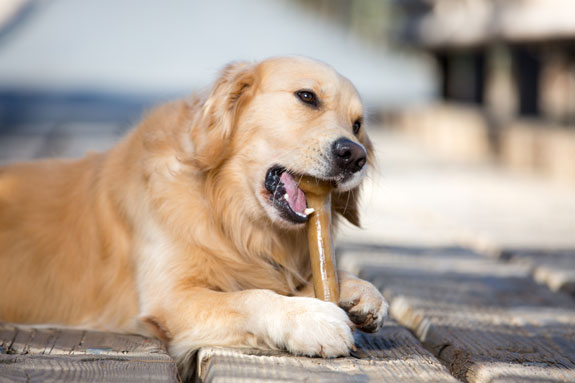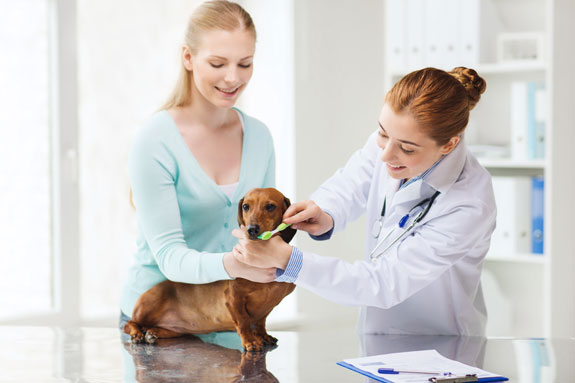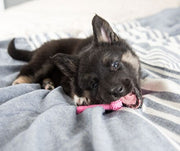5 Easy Tips to Keep Your Dog's Teeth Clean

When you think of dental hygiene, your dog's teeth are probably the last thing on your mind. It's not the easiest thing to keep your dog's teeth clean, especially if he eats several times a day, keeps picking up various things with his mouth, and doesn't let you touch his mouth. However, there is no need to worry. After all, dogs are not as prone to developing cavities as humans are. However, they still can develop other problems such as plaque build-up, gingivitis, and tartar. These canine dental problems can potentially lead to life-threatening infections, such as heart, liver, and kidney diseases. Luckily, there are many routes to prevent that from happening. Keeping your dog's teeth clean can be easier than you think. Keep reading for 5 easy tips for keeping your dog's teeth clean.
1. Brush your dog's teeth the right way
For both dogs and humans, brushing one's teeth is the foundation to superior oral health. Therefore, it's ideal to brush your dog's teeth daily. However, we know not every pet parent has the time to do that, so brushing your dog's teeth at least once a week will suffice. Most dogs might night like their teeth being brushed at first, but they can learn to tolerate the process with the right approaches. Don't overdo it the first few times, start slowly, and stop if your dog gets agitated. Brush his teeth once he's had a decent amount of exercise so it's easier for him to sit still. There are specifically toothbrushes and toothpaste for dogs. (DO NOT use human toothpaste for your dog. Human toothpaste can be extremely poisonous to dogs.) Remember to end each teeth cleaning session with a small reward.
2. Get your dog some chews to clean their teeth
You'll have many options to choose from with our variety of Nylon Dog Chews and Chew Toys specifically designed to clean and strengthen your dog's teeth and gums. Designed to minimize the build-up of tartar and plaque, these products not only polish your dog's teeth to shine but also stimulate your dog's natural cravings for a tasty treat. It's also a great way for your dog to keep himself entertained and prevent them from chewing a pair of shoes. Dogs of all ages chew their way into anything. For puppies, gnawing naturally soothes teething pain, while for adult dogs, chewing keeps them mentally stimulated. Chew toys are made of a variety of materials like plastic, rubber, nylon, and rawhide. They also come in various shapes, flavors, and sizes. Remember to monitor your dog anytime you introduce new chews or toys to them. If pieces break off, immediately remove them from being chewed on or played with.

3. Dry Food > Wet Food
Brushing your dog's teeth is easier said than done. So, if you do not have the time or energy to do it, you can simply feed dry food like crunchy kibble to your dog. Lessen feeding soft food to your dog as it's more likely to stick to their teeth and cause decay in the long run. Unless you are specifically instructed by your veterinarian to stick to a wet food diet, it's best to feed your dog a predominantly dry food diet.
4. Spritz some dental dog spray
For a quick solution to your dog's smelly breath, dog dental spray is the answer. We've all had snuggle sessions cut short or ruined by a whiff of doggy breath. Spray it alone or in between brushings, and you're good to go. Its odor-eliminating effect can also kill plaque-causing bacteria and remove and prevent tartar and plaque build-up. Most dogs do not have the patience to stay still during tooth brushing sessions, so dental spray can be a quick alternative now and then (it shouldn't be a permanent alternative to regular brushing). Make sure your dog doesn't eat thirty minutes before and after administering the spray.
5. Veterinarians are your dog's friends
Regular professional teeth cleanings with a veterinarian are an essential part of good oral hygiene. Veterinarians are skilled at identifying, preventing, and treating any dental problems your dog may have that could otherwise go unnoticed. At least one oral exam and cleaning a year will suffice. However, some dog breeds may require more frequent cleanings to avoid periodontal diseases. Seeing a vet may be the most expensive and time-consuming tip we have, but trust us, your dog's teeth with indeed thank you for it!

We've discussed 5 easy tips to keep your dog's teeth clean and healthy. Making simple changes in your everyday routine can go a long way. We hope you've picked up some much-needed advice that'll benefit both you and your dog.
Previous article

Next article

Related posts
View all-

National K9 Veterans Day: Why and How to Celebrate
National K9 Veterans Day is celebrated every year on March 13th. This year its on Saturday March 13th, 2024. This day was established to recognize and celebrate the contributions that Military Working Dogs.
Read Article -

Puppy Training Tips
Training your pup from day one helps set a solid foundation for good behavior and a well-adjusted adult dog. Puppies thrive on structure, and a predictable routine makes learning easier.
Read Article -

Spring Cleaning Tips for Pet Parents
Say goodbye to the winter germs and hello to all the new spring smells! The beginning of spring is the perfect time to clean your house. For pet owners, this can mean more in-depth cleaning in areas other people don't have to worry about. We will give you some helpful tips and tricks so that cleaning up after your pet seems a little less daunting. Read Article



